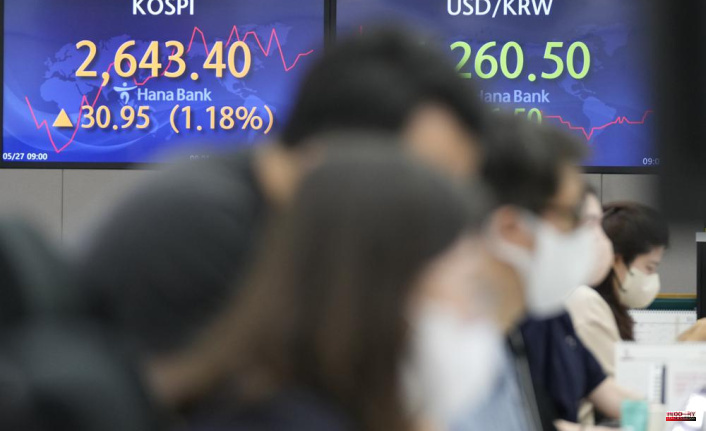Asian shares rose Friday after investors cheered strong earnings reports from U.S. retailers, which sent U.S. shares higher.
In early trading, benchmarks rose across the region including South Korea, Australia, China and Australia.
Yeap Jun Rong is a market strategist at IG Singapore. He stated that "improved risk sentiments on Wall Street, in addition to earnings outperformance by Alibaba and Baidu may aid in fuelling some upside for Asia region into today’s session."
After reporting better than expected results, shares of Baidu and Alibaba have risen. This is despite some concerns regarding the negative effects of COVID-19 restrictions. Both shares rose in early trading.
Investors will be interested in Japan's economic trajectory as data on manufacturing and housing for April will be released next week. Analysts expect that the numbers will be lower due to a slowerdown in China's exports during this period.
There is some optimism, though. Tokyo's restrictions on tourists are being eased and the daily limit for tourists rising from 10,000 to 20,000 beginning June 1 to 20,000. Fumiokishida, the Japanese Prime Minister, is expected to continue parliamentary negotiations with a supplementary Budget, which could be a plus for investors.
Japan's benchmark Nikkei225 gained 0.8% in the early trading period to 26,811.06. The S&P/ASX 200 in Australia gained 0.9% to 7,167.70. South Korea's Kospi rose 1.0% to 2,638.92. The Hang Seng in Hong Kong jumped 2.8% to 20,687.39 while the Shanghai Composite climbed 0.6% to 3,141.15
Wall Street finished broadly higher after seven consecutive weeks of declines, which was the longest stretch since 2001.
Bond yields increased. The 10-year Treasury yield, which is used to set mortgage interest rates, increased to 2.75%, from 2.74% on Wednesday.
The S&P 500 saw roughly 90% of stocks rise, led by technology companies, banks, and retailers. Despite trading being choppy this week the market has pushed higher than the previous five weeks when the S&P 500 suffered a pullback of 2% to 3% at least one day.
Liz Young, SoFi's head of investment strategy, said, "It's nice seeing a few days in the green. And this might end up being our first week without a humongous day." "But I wouldn’t declare victory prematurely and assume that we’re in the clear."
S&P 500 rose by 79.11 point, or 2.2%, to 4,057.84. The Dow gained 516.91 point, or 1.6% to 32,637.19 and the Nasdaq gained 305.91 point, or 2.7% to 11,740.65. Russell 2000 index of smaller businesses climbed 39.07 point, or 2.2% to 1,838.24.
The broader market was led by retailers on Thursday. Macy's surged 19.3% following an increase in its profit forecast for the year after strong financial results from its first quarter. Dollar General soared 13.7%, while Dollar Tree climbed 21.9% to the highest gain in the S&P 500. This was after discount retailers reported solid earnings that gave investors optimistic forecasts.
Investors are closely monitoring the retail sector to see how much inflation is causing consumers and companies. A volatile market was rattled by weak reports last week from several large companies, including Walmart and Target.
Philip Orlando, Federated Hermes' chief equity market strategist, said that "we're not convinced we're out of the woods here." "There were many negative reports last week, and what these companies have discussed is the state of the economy.
Inflation has reached a 4-decade high. Businesses have increased prices for everything, from food and clothing, to offset rising costs. Inflation pressures were exacerbated by Russia's invasion in Ukraine. This resulted in higher energy costs and increased food commodity prices. As China tried to control COVID-19 cases, China locked down several cities in China's supply chain.
Although consumers have shown resilience in their spending habits, inflation pressures remain persistent. This could lead to a shift or pullback in consumer spending away from more costly items to necessities.
After a late push on markets Wednesday, the Federal Reserve's most recent meeting details confirmed that there were more rate increases. This led to broad gains Thursday.







